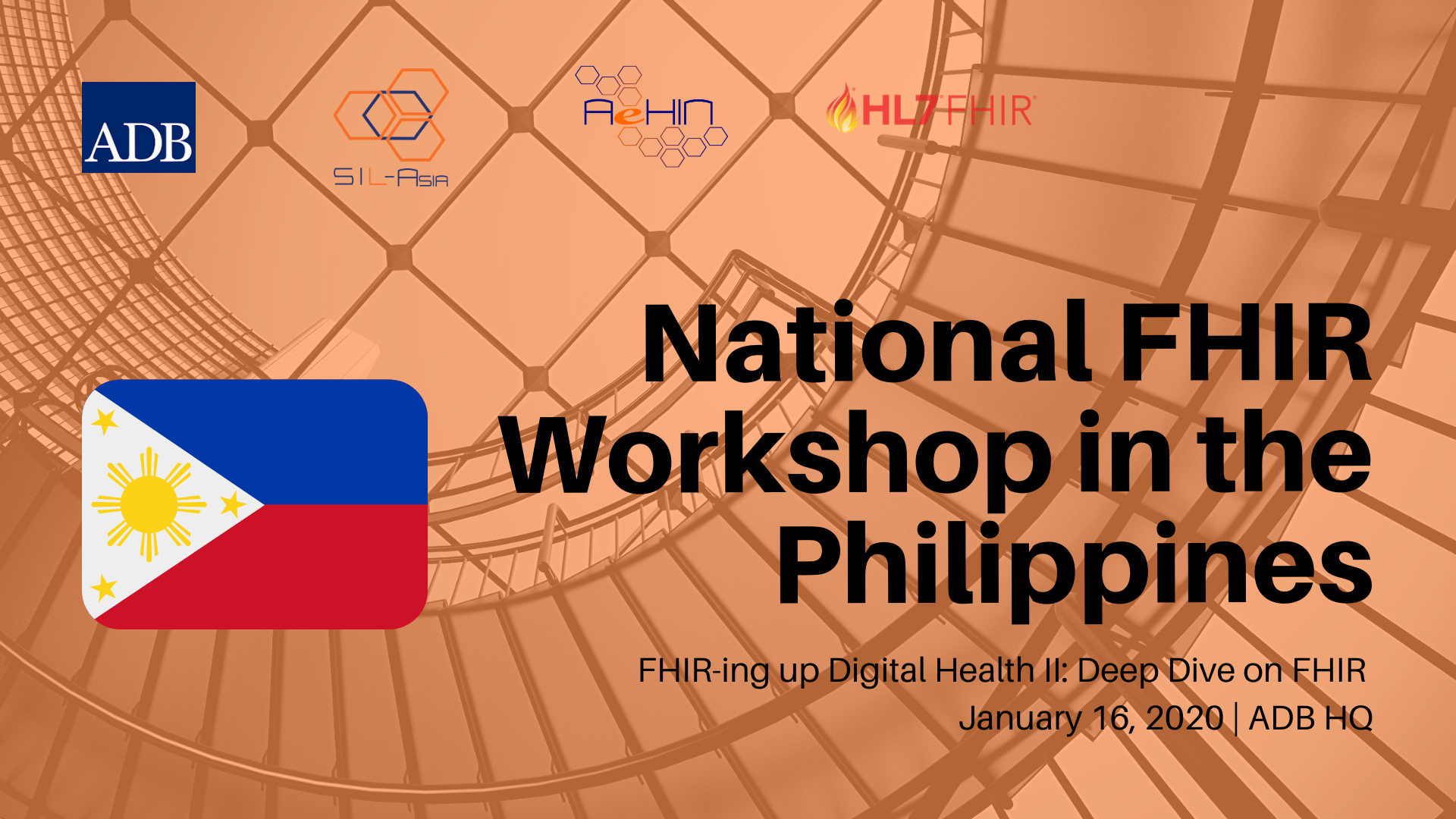Rationale
Building on the first
FHIRing up Digital Health in the Philippines activity, a kick-off symposium organized by SIL-Asia last May 24 2019, the second round of the event aims to gather digital health stakeholders in the country once more for a deep dive into the world of
Health Level Seven International – Fast Healthcare Interoperability Resources (HL7-FHIR). Whereas in the first event, SIL-Asia focused on the introduction and basics of HL7-FHIR and a few discussions on how might it be applicable in the Philippines, FHIRing up Digital Health II will dwell on a deep dive session on FHIR. This will be facilitated by
James Agnew, Lead Architect with the Centre for Global eHealth Innovation (UHN) in Toronto Canada, and a member of the FHIR Core Team. The event also aims to generate a concrete action plan on how the country can adopt FHIR as a standard.
Health Level Seven International – Fast Healthcare Interoperability Resources (HL7-FHIR) is the emerging standard in health data exchange and sharing. HL7-FHIR uses the power of the web to exchange data across disparate platforms and technologies. Health Information Exchanges, Hospitals Information Systems, and even large tech companies, such as Google and Apple, are using HL7-FHIR in handling health data. Google Healthcare provides Application Programming Interfaces (APIs) that can be accessed by Electronic Medical Records (EMRs) and Electronic Health Records (EHRs) in sharing data with web applications (and vice versa). One of the standards being used is HL7-FHIR. Apple uses HL7 FHIR to connect the Apple Health App with various EMRs/EHRs and even wearables such as the Apple Watch.
The workshop will be conducted against the backdrop of the new Universal Health Care (UHC) Act in the Philippines. An important component of the act is anchored on the development of service delivery networks (SDN) in the whole country. With these SDNs, patients are expected to have a primary care provider, but healthcare should be available anywhere the patient is. For this model to work, it requires that health information systems deployed in facilities must easily communicate with one another and share patient data.
While there are efforts in developing a Philippine Health Information Exchange (PHIE) with the ultimate goal of allowing the exchange of patient data, as of the moment, the only available workflow for PHIE is on insurance claims with the Philippine Health Insurance Corporation (PhilHealth). The Philippine digital health ecosystem is still shaping up to enable meaningful exchange of data that can cut across various workflows.
The Philippines can reap the many benefits that may be gained in using HL7-FHIR. By adopting FHIR as a data model, the Department of Health can encourage the development of more standards-based health information systems in the country. In addition, HL7-FHIR can provide an interoperability server that can be used as a layer for the PHIE. It can also pave the way for interfacility exchange of data, which is one of the foundational requirements in implementing the UHC Act.
This workshop aims to show how HL7-FHIR as a standard can be leveraged in the context of interoperable health systems that will empower the SDNs and the Primary Care set-up defined in the UHC Law. Invitees are from the government (health, science and technology, research and development, and information and communications technology), academe, insurance, hospitals, EMR providers, and the private sector. Aside from HL7-FHIR, a discussion will be opened up for a possible establishment of an HL7-FHIR Community of Practice in the Philippines to further advance the possible implementation of HL7-FHIR in the country.
REGISTRATION HAS BEEN CLOSED
Benefits of FHIR
FHIR is currently the emerging standard in digital health. It utilizes web technologies to transfer data between systems. The following are the benefits of using FHIR:
- It is standards based. International information systems in digital health are expected to implement FHIR.
- FHIR already provides a data model. EMR developers no longer need to define their own data model.
- FHIR servers already have integrated databases. Application developers can only concentrate on developing an interface and no longer need to implement the database.
- FHIR uses standard web technologies. This makes it usable to EMRs, regardless of the platform on how the EMRs are implemented.
- Since FHIR uses web technologies, there is a wide pool of software developers who can implement and integrate with FHIR.
- FHIR servers provide a plug and play platform for EMRs. With FHIR servers, EMRs can easily connect to the server and pull out data.
Learning Outcomes
At the end of the one-day workshop, participants should be able to:
- Introduce HL7-FHIR;
- Discuss the benefits of using HL7-FHIR;
- Demonstrate how FHIR works (through a deep dive session); and
- Explain how FHIR can be used at the national scale in the Philippine context.
Program
8:30 AM – 9:00 AM – Checking in/registration of participants
9:00 AM – 9:30 AM:
- Admin Matters (Security Video)
- Opening Remarks: Dr. Eduardo Banzon
- Opening Remarks: Dr. Alvin Marcelo
- Expectation Settings: Philip Christian Zuniga
9:30 AM – 10:00 AM:
Keynote on UHC – Keynote Speaker
10:00 AM – 10:15 AM:
Coffee Break
10:15 AM – 10:30 AM:
Introduction to Standards and Interoperability Lab – Asia – Philip Christian Zuniga
10:30 AM – 12:00 NN:
Introduction to HL7 FHIR – James Agnew
12:00 NN – 1:00 PM:
Lunch
1:00 PM – 1:30 PM:
CRUD/Search on FHIR – Ada Cariaga
1:30 PM – 2:00 PM:
Starting the FHIR – Philip Christian Zuniga
2:00 PM – 2:30 PM:
Clinician’s View on FHIR – Raymond Sarmiento
2:30 PM – 2:45 PM:
International Initiatives in FHIR – Jurgen Brandstatter
2:45 PM – 3:00 PM:
Coffee Break
3:00 PM – 4:00 PM:
Break-out: How do I envision FHIR helping me?
4:00 PM – 4:30 PM:
Reporting Back
4:30 PM – 5:00 PM:
Next Steps
Closing


